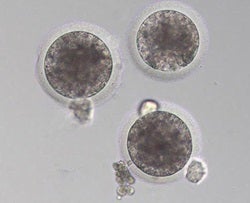Embryo Transfer, Oocyte Collection, and ICSI Services
The equine embryo transfer program was started in 1984 with nonsurgical transfer of embryos. Research in the Section of Reproduction demonstrated equine embryos can be cooled and transported for up to 24 hours. The Hofmann Center offers a wide range of equine embryo transfer services (see the list of options below). The center has an on-site embryo transfer recipient mare herd available for embryos from donor mares managed by the Hofmann Center reproduction team.
If you are interested in our embryo transfer and Oocyte Collection services, please contact a member of our reproduction team today by calling us at 610-925-6364. For ICSI services please contact Kim Gleason (610) 925-6575 at kimgl@upenn.edu.
Equine Embryo Transfer Options
Donor Mare Options and Embryo Options
Below are the options that our service provides. The Hofmann Center manages many of these options except for the one noted below.
- Recovered embryo transferred into a recipient mare provided by the Hofmann Center.
- Recovered embryo shipped to another facility for transfer.
- Recovered embryo transferred into a recipient mare provided by the owner.
- Recovered embryo transferred into a recipient mare provided by the Hofmann Center or into a recipient mare provided by the owner.
Donor mare managed by an outside veterinarian
Contact
Appointments
(610) 925-6364
Forms
Embryo Transfer Fees (PDF)
TVA Consent Form (PDF)
Stallion Info & Fees (PDF)
Oocyte Collection & ICSI Services
Oocyte Recovery for Intracytoplasmic Sperm Injection (ICSI)
For mares that are not suited for embryo transfer, oocyte recovery for performance of ICSI is another option that can produce embryos for transfer.
Oocyte aspiration and ICSI can be used for mares with chronic uterine infections, cervical problems, oviductal problems, and other issues that prevent them from conceiving or carrying a pregnancy.
Additionally, oocytes can be recovered post-mortem, thus allowing for foals to be produced even after the death of the mare.
The Hofmann Center offers oocyte recovery services for mares, both alive and deceased, as well as ICSI services through New Bolton Center’s Penn Equine Assisted Reproduction Laboratory (PEARL).
Oocyte Recovery from Live Mares
For live mares, oocytes, or eggs, are recovered from the mare’s ovaries using ultrasound guided transvaginal follicular aspiration. Follicles on the mare’s ovaries are aspirated while the mare is standing in stocks under heavy sedation. We boast an average 50% oocyte recovery rate per aspirated follicle – among the best recovery rates you can find.
The recovered oocytes are taken to our laboratory at New Bolton Center, PEARL (the Penn Equine Assisted Reproduction Laboratory), which specializes in intracytoplasmic sperm injection (ICSI). There, the oocytes are matured, each oocyte injected with a single sperm cell and then allowed to develop in culture for several days.
Any resulting embryo(s) can be shipped to local embryo transfer centers for transfer into recipient mare(s), or vitrified for later transfer.
Oocyte Recovery from Deceased Mares
For deceased mares, the ovaries can be recovered by your veterinarian on the farm immediately following death or euthanasia.
The ovaries are transported to the Hofmann Center for oocyte recovery. Every follicle in the ovary is individually scraped multiple times to recover the oocyte. We have an excellent oocyte recovery rate of over 80% per scraped follicle.
Recovered oocytes are taken to our PEARL Lab, specializing in intracytoplasmic sperm injection (ICSI). The remainder of the procedure is the same as that described above.
If you are interested in oocyte recovery and ICSI, please contact our reproduction team today.
This photo from our PEARL Lab shows an equine egg (oocyte) being held by a holding pipette. Then, a tiny needle used to pick up a single sperm from the chosen stallion’s semen, and the needle is then advanced through the outer covering of the egg (the zona pellucida), through the egg’s cell membrane and into the center of the egg. The sperm is then gently injected and the needle is withdrawn.

Reproductive technology has been a strength of Penn Vet’s since research on mammalian embryo culture in the 1960s, followed by Benjamin Brackett, PhD production of the first calf via in vitro fertilization in 1981, and Ralph Brinster, PhD’s groundbreaking research on transgenesis in the early 1980s. The first use of ovariectomized mares as embryo recipients was reported here at New Bolton Center shortly thereafter. It is fitting that our clinical services continue in this tradition by offering advanced reproductive services for our patients.
After the ICSI procedure, the newly fertilized egg is cultured under special conditions in a laboratory incubator for about seven days, to allow it to develop into an embryo. This picture shows two horse embryos four days after fertilization using ICSI. After another three to four days in the incubator, these embryos will be ready to transfer to a recipient mare.

This picture shows horse embryos seven days after fertilization using ICSI.
These embryos, now termed blastocysts, are ready to transfer to recipient mares.
